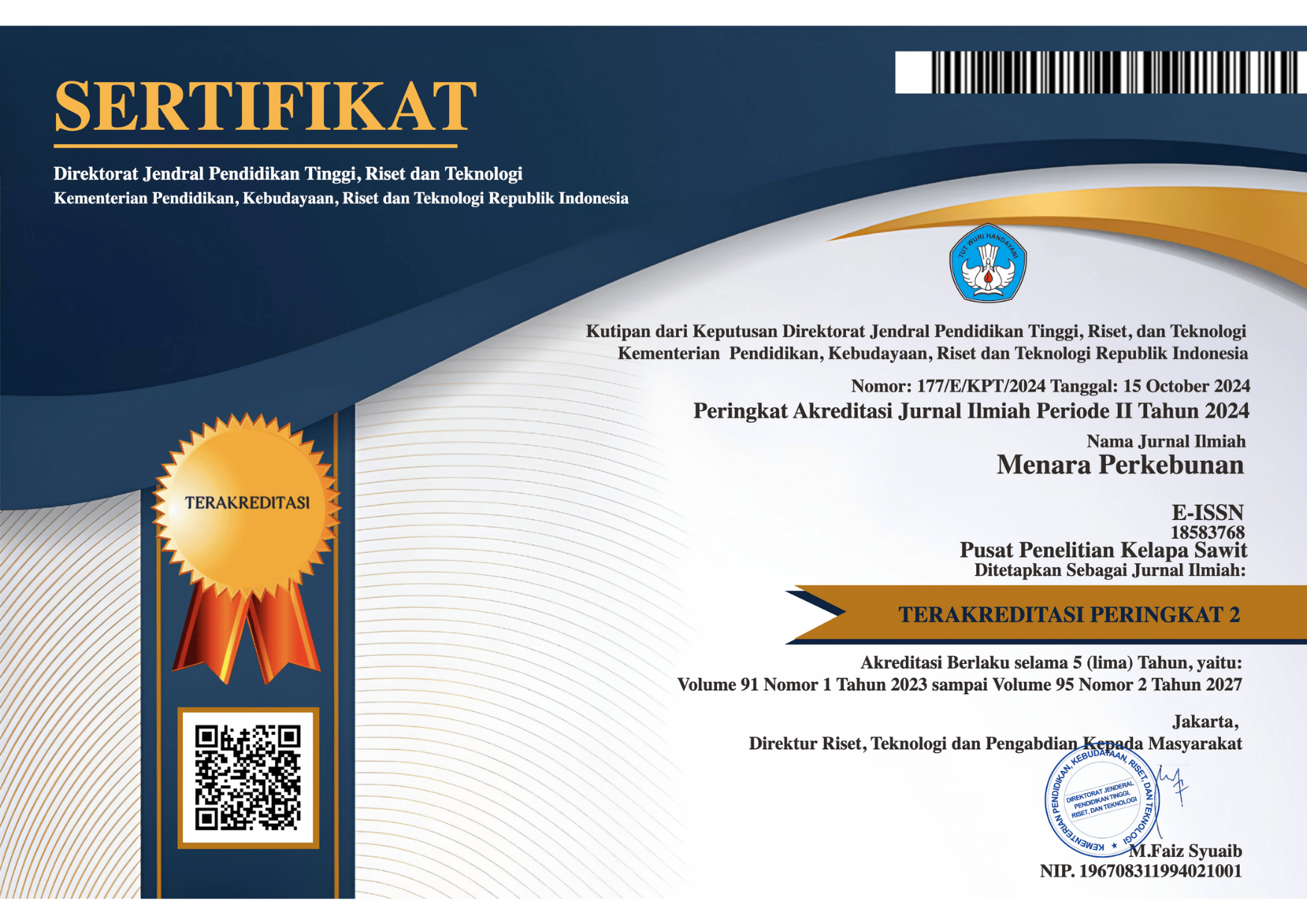Kemampuan jamur pelapuk kayu isolat JPA dan Trichoderma Sp. S2-2 dalam mendegradasi tandan kosong kelapa sawit untuk menghasilkan selulosa The capability of wood rot fungus JPA isolate and Trichoderma sp. S2-2 in degradation of oil palm empty fruit bunches to produce cellulose
DOI:
https://doi.org/10.22302/iribb.jur.mp.v82i2.17Keywords:
Oil Palm Empty Fruit Bunches, degradation, wood rot fungi, JPA Isolate, Trichoderma sp. S2-2Abstract
Abstract
Oil palm empty fruit bunches (OPEFB) are the ligno-cellulosic wastes from palm oil processing. They can be used to produce raw materials for value-added products. The purpose of this study was to determine the degradation capacity of JPA wood rot fungi and Trichoderma sp. S2-2 on OPEFB. The 500 g of substrates consisted of 81% of OPEFB, 15% bran, 1.5% lime and 1.5% gypsum were used for growing. The substrates were inoculated with five treatments i.e without isolate (K); with JPA isolate (JPA); with Trichoderma sp. S2-2 (T); with the two isolates (JPA + T); and with JPA isolate and after four weeks of incubation inoculated with Trichoderma sp. S2-2 [(JPA)+T]. All treatments were incubated for eight weeks. The results showed that JPA+T was the best treatment which the two isolates must be inoculated simultaneously for degradation of OPEFB. Lignin and cellulose content on JPA+T treatment respectively were 20.83% and 33.77%. C/N ratio of OPEFB degraded with JPA+T was lower than the C/N ratio of TKKS degraded with Trichoderma harzianum and TKKS degraded with EM4 in previous study.
Abstrak
Tandan kosong kelapa sawit (TKKS) merupakan limbah lignoselulosa dari pengolahan minyak kelapa sawit. TKKS dapat dimanfaatkan untuk memperoleh bahan baku untuk produk bernilai tambah. Tujuan penelitian ini adalah untuk mengetahui kemampuan degradasi jamur pelapuk kayu isolat JPA dan Trichoderma sp. S2-2 pada TKKS. Sebanyak 500 g substrat terdiri dari 81% TKKS, 15% dedak, 1,5% kapur, dan 1,5% gypsum digunakan untuk per-tumbuhan. Substrat diinokulasi dengan lima perlakuan yaitu tanpa isolat (K); dengan isolat JPA (JPA); dengan Trichoderma sp. S2-2 (T); dengan isolat JPA dan setelah empat minggu inkubasi, diinokulasi dengan Trichoderma sp. S2-2 [(JPA+T)]. Semua perlakuan diinkubasi selama delapan minggu. Hasil percobaan menunjukkan bahwa perlakuan JPA+T adalah perlakuan terbaik yaitu kedua isolat tesebut harus diinokulasi secara bersamaan untuk mendegradasi TKKS. Kandungan lignin dan selulosa TKKS dengan perlakuan JPA+T masing-masing adalah 20,83% dan 33,77%. Rasio C/N TKKS hasil degradasi dengan JPA+T lebih rendah daripada rasio C/N pada TKKS yang didegradasi dengan Trichoderma harzianum dan TKKS yang didegradasi dengan EM4 pada penelitian sebelumnya.
Downloads
Downloads
Submitted
Accepted
Published
How to Cite
Issue
Section
License
Authors retain copyright and grant the journal right of first publication with the work simultaneously licensed under a Creative Commons Attribution License that allows others to share the work with an acknowledgement of the work's authorship and initial publication in this journal.













